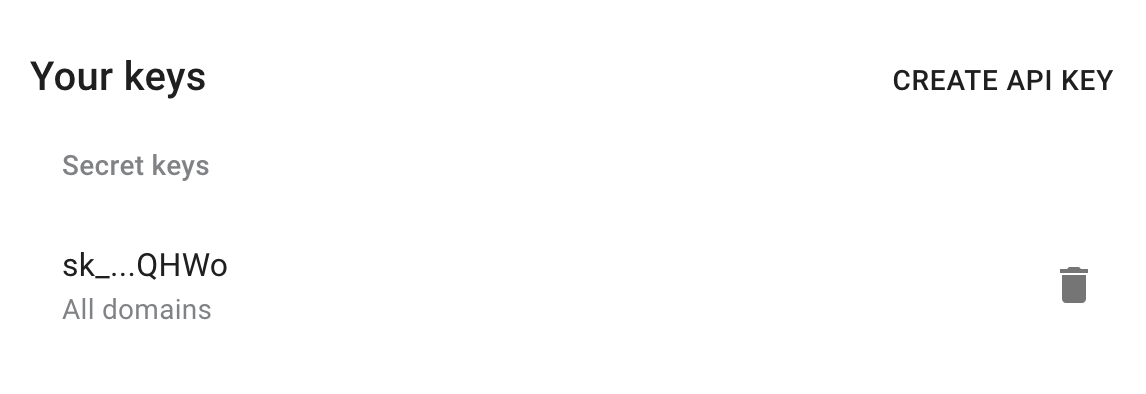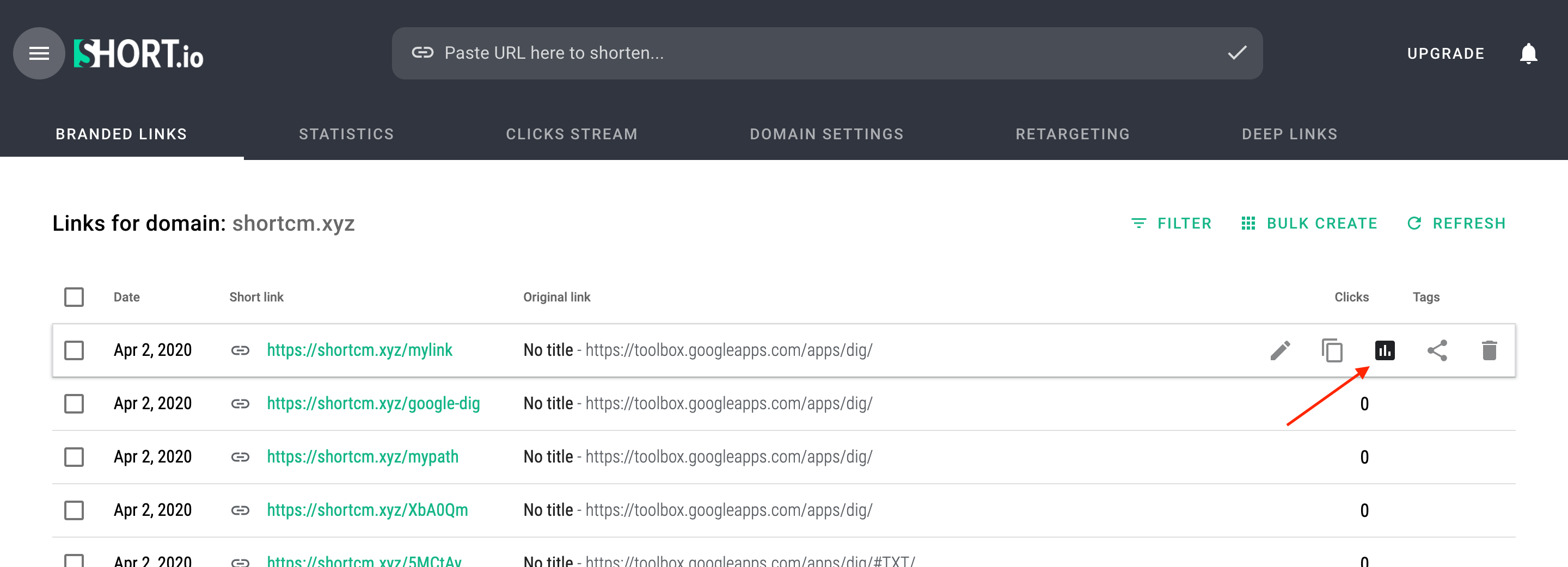Link Statistics
Returns detailed statistics for link in a given period
Information below might be outdated - please visit our recently updated API Reference
The instruction below shows how to get detailed statistics for a link.
1) Get your API key here: https://app.short.io/settings/integrations/api-key
- Click "Create API key".
- Add a Secret key.

2) Copy an ID of a short link you want to get detailed statistics.
- Open the statistics of the short link.
- Copy the link ID.


3) Install prerequisites for requests.
pip install requests
npm install --save axios
npm install qs
Now everything is ready to run the following snippet. It will send detailed statistics of a short URL.
4) Create a file: filename.py/ .js/ .rb. Use the code snippet below.
Please, replace LINK_ID and Period with appropriate values.
Available periods for statistics: today, yesterday, total, week, month, lastmonth, last7, last30 and custom.
import requests
url = "https://api-v2.short.io/statistics/link/linkID"
querystring = {"period":"total","tzOffset":"0"}
headers = {
'accept': "*/*",
'authorization': "<<apiKey>>"
}
response = requests.request("GET", url, headers=headers, params=querystring)
print(response.text)
const qs = require('qs')
const axios = require('axios');
axios.get('https://api-v2.short.io/statistics/link/linkID', {
params: {
period: 'total',
tzOffset: '0'
},
headers: {
accept:'*/*',
authorization: '<<apiKey>>'
}
})
.then(function (response) {
console.log(response.data);
})
.catch(function (response) {
console.log(response);
});
require 'uri'
require 'net/http'
require 'openssl'
url = URI("https://api-v2.short.io/statistics/link/linkID?period=total&tzOffset=0")
http = Net::HTTP.new(url.host, url.port)
http.use_ssl = true
http.verify_mode = OpenSSL::SSL::VERIFY_NONE
request = Net::HTTP::Get.new(url)
request["accept"] = '*/*'
request["authorization"] = '<<apiKey>>'
response = http.request(request)
puts response.read_body
5) Launch the file.
python filename.py
node filename.js
ruby filename.rb
6) JSON Response.
Once you run the code, you will see the response.
{
totalClicks: 42,
humanClicks: 8,
humanClicksChange: '0',
totalClicksChange: '0',
clickStatistics: { datasets: [ [Object] ] },
interval: {
startDate: null,
endDate: null,
prevStartDate: null,
prevEndDate: null
},
referer: [],
social: [],
browser: [
{ score: 6, browser: 'Chrome' },
{ score: 1, browser: 'Safari' },
{ score: 1, browser: 'Firefox' }
],
country: [
{ score: 4, country: 'US', countryName: 'United States' },
{ score: 3, country: 'FR', countryName: 'France' },
{ score: 1, country: 'DE', countryName: 'Germany' }
],
city: [
{ score: 2, city: '4744870', name: 'Ashburn' },
{ score: 2, city: '5714964', name: 'Boardman' },
{ score: 1, city: '2921232', name: 'Gera' }
],
os: [ { score: 5, os: 'Windows' }, { score: 3, os: 'Mac OS X' } ]
}
7) How to request statistics for a custom period
startDate and endDate parameters require date format in milliseconds from epoch.
Here you can convert your date: https://www.epochconverter.com/
pip install arrow
import requests
import arrow
url = "https://api-v2.short.cm/statistics/link/linkID"
querystring = {"period":"custom","tzOffset":"0","startDate": arrow.get('2020-05-01T21:23:58.970460+07:00').timestamp * 1000,"endDate": arrow.get('2020-05-04T21:23:58.970460+07:00').timestamp * 1000}
headers = {
'accept': "*/*",
'authorization': "<<apiKey>>"
}
response = requests.request("GET", url, headers=headers, params=querystring)
print(response.text)
const qs = require('qs')
const axios = require('axios');
axios.get('https://api-v2.short.cm/statistics/link/283366412', {
params: {
period: 'total',
tzOffset: '0',
startDate: new Date("2020-04-30T15:56:53").valueOf(),
endDate: new Date("2020-05-05T15:56:53").valueOf()
},
headers: {
accept:'*/*',
authorization: '<<apiKey>>'
}
})
.then(function (response) {
console.log(response.data);
})
.catch(function (response) {
console.log(response);
});
require 'uri'
require 'net/http'
require 'openssl'
url = URI("https://api-v2.short.cm/statistics/link/linkID?period=total&tzOffset=0&startDate=1588231150000&endDate=1588663150000")
http = Net::HTTP.new(url.host, url.port)
http.use_ssl = true
http.verify_mode = OpenSSL::SSL::VERIFY_NONE
request = Net::HTTP::Get.new(url)
request["accept"] = '*/*'
request["authorization"] = '<<apiKey>>'
response = http.request(request)
puts response.read_body
{
totalClicks: 21,
humanClicks: 7,
humanClicksChange: '0',
totalClicksChange: '0',
clickStatistics: { datasets: [ [Object] ] },
interval: {
startDate: '2020-04-30T12:56:53.000Z',
endDate: '2020-05-05T12:56:53.000Z',
prevStartDate: null,
prevEndDate: null
},
referer: [ { score: 1, referer: 't.co' } ],
browser: [
{ score: 4, browser: 'Chrome' },
{ score: 1, browser: 'Mobile Safari' }
],
country: [
{ score: 6, country: 'US', countryName: 'United States' },
{ score: 1, country: 'DE', countryName: 'Germany' }
],
city: [
{ score: 2, city: '4744870', name: 'Ashburn' },
{ score: 1, city: '4509177', name: 'Columbus' },
{ score: 1, city: '5714964', name: 'Boardman' }
],
os: [
{ score: 3, os: 'Windows' },
{ score: 2, os: 'Mac OS X' },
{ score: 1, os: 'iOS' },
{ score: 1, os: 'Linux' }
]
}
Updated 12 months ago
